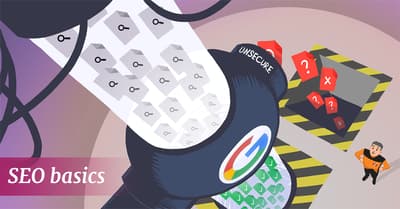What does Google do?

How does Google work? What does Google actually do? For many of you, this will be fairly old news. But for everyone who is new to the world of SEO: let me explain what Google does and how SEO works. In a way that is easy to follow, because understanding this really helps you create an SEO strategy that works! Let’s take a look ‘behind’ the scenes.
How does Google work?
Search engines like Google follow links. They follow links from one web page to another. Google consists of a crawler, an index, and an algorithm. The crawler follows the links on the web. It goes around the internet 24/7 and saves the HTML- version of all pages in a gigantic database called the index. This index is updated if the Google crawler comes by your website again and finds new or revised web pages. The new version of this page is saved. Depending on the traffic on your site and the number of changes you make on your website, crawlers come around more or less often.
For Google to know of the existence of your site, there first has to be a link from another site – one that is already in the index – to your site. If crawlers follow that link, it will lead to the first crawler-session and the first time your site is saved in the index. From then on, your website could appear in Google’s search results.
Read more: Bot traffic: What it is and why you should care about it »
Google’s secret algorithm
After indexing your website, Google can show it in the search results. The search engine tries to match a certain search query with web pages that it has indexed. To do so, Google has a specific algorithm that decides which pages are shown in which order. How this algorithm works exactly is a secret. Nobody knows exactly which factors decide the ordering of the search results.
The algorithm isn’t static. It changes regularly with new updates. The factors that determine the ordering and the importance of the different factors change very often. Although the algorithm is secret, Google does tell us which things are important. We don’t know how important though, and we don’t know whether Google communicates all factors to us. Testing and experimenting give us a relatively good feel for the important factors and changes in these factors. We incorporate these factors into our Yoast SEO plugin and tell you about them in our many blog posts.
Google’s results page
Google’s results page – also known as SERP- shows about 7 or 10 links to sites that fit your search the best (according to Google). We refer to these results as organic search results. If you click to the second page of the result page, you see even more results. The further down the results your website is, the less likely it is that someone will click on your result and find your site.
Most of the time, there are a few paid links above the 10 links on the first page. These links are ads; people have paid Google to put these links at the top of the site when users search for a specific term. Prices for these ads vary greatly, depending on the competitiveness of the search term. In addition to these organic and paid results, there are also a few other elements that you can find on Google’s search engine results page.
Keep reading: SEO vs Pay Per Click advertising: Which one to choose? »
The value of links for search engines
It’s very important to have a basic understanding of how Google and most other search engines use links. The number of links pointing to a page is used to determine how important that page is. So, the more links a specific site has, the more important search engines believe it is. Both internal links (coming from the same website), as well as external links (from other websites), can help in the ranking of a webpage in Google. Some links are more important than others, though. Links from websites that have a lot of incoming links themselves are generally more important than links from small websites with only a few incoming links.
The importance of links actually lead to active link building quite quickly. As long as you are collecting links that are useful and logical, link building can be a good SEO strategy. But if you collect (or worse buy) shady links, Google may punish you for that. To help you figure out the right strategy, we wrote an article that discusses 5 link building DON’Ts you didn’t know about.
SEO and Google
Search Engine Optimization (SEO) is the practice of optimizing sites to try and make them appear in a high position in the organic search results. In order to do so, SEO tries to shape a website according to Google’s algorithm. That being said, this algorithm is aimed at giving online users the best answer to their question and best experience possible. Although Google’s algorithm remains secret, over a decade of experience in SEO has resulted in a pretty good idea about the important factors.
We monitor all communications by Google about changes in the algorithm, and we test what actually works in the search engines. At Yoast, we advocate holistic SEO. Your SEO strategy should never feel like a trick. The search engine wants to show the user the result that fits his or her search query best. That’s how Google works, in a nutshell. If you want to appear high in the results for that specific search term, make sure to write awesome and SEO-friendly content and offer users a good online experience.
Read on: Complete beginner’s guide to SEO »


Discussion (10)